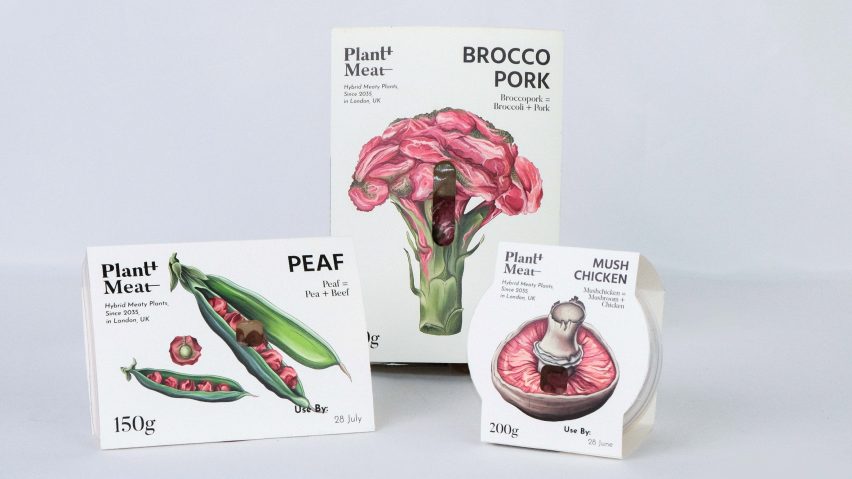At Dutch Design Week, London-based food designer Leyu Li showcased three conceptual products that combine lab-grown meat with vegetables, called Broccopork, Mushchicken and Peaf.
The speculative project suggests how lab-grown meat might be cultivated on plant tissue, resulting in a range of hybrid meaty vegetables.
Leyu Li presented the designs as part of Future Farmers Market, an exhibition of imaginary food products that formed part of the Embassy of Food at Dutch Design Week.
The designer also posted a series of TikTok videos from the pseudonym account Meaty Aunties, promoting the products to an audience who don't know whether they are real or not.
Her aim is to explore whether customers would be more open to buying cultivated meat – which is grown from real animal cells – if it came in the form of vegetables.
"People share their plant-based food reviews everywhere and anytime at TikTok," she said. "These findings make me more curious about how people will react to cultivated meat products in the future."
Cultivated meat has existed for some time, with the "world's first lab-grown steak" created back in 2018. But it only became commercially available for the first time in 2020, when Singapore approved the sale of lab-grown chicken nuggets.
In November 2022, California-based Upside Foods became the first cultivated meat company to be granted approval by the United States Food and Drug Administration (FDA).
"The supermarket shelves are filled with plant-based meat and cultivated meat is on the horizon," said Li.
"What debates and dialogues will happen around lab-grown meat? How might in-vitro biotech change people's daily lives and food culture?"
Although cultivated meat is slaughter-free it is not plant-based, making it controversial among vegetarians and vegans. A recent survey by vegan dating app Veggly found that only 24 per cent of vegans would be open to eating it.
Li's products suggest how lab-grown meat might be marketed to consumers who are not used to preparing or eating meat.
Although the products are imaginary, they are based on the existing science around lab-grown meat. Li consulted cellular agriculture startup Hoxton Farms to understand "the plausibility of the current tissue engineering".
This led her to think that meat could be grown on the surfaces of specific vegetables including broccoli, mushrooms and peas.
"Plants' surface works as scaffolding and meat tissue cells are grown along these structures," she explained. "So customers can easily capture both the existence of meat and plants."
The designer designed a brand around these products, creating packaging that shows what these products might look like.
Her TikTok videos suggest the products have already been made available to food influencers, showing how they might be prepared for a meal. So far, her videos have garnered more than three million views and thousands of comments.
"The responses to this series of videos were incredibly varied," said Li.
"Some individuals genuinely believed in the existence of Broccopork and were very concerned about this biotechnological development. Interestingly, some people saved the post with plans to purchase Broccopork in the future."
Future Farmers Market was on show at Evoluon in Eindhoven during Dutch Design Week 2023, which ran from 21 to 29 October. See Dezeen Events Guide for more architecture and design events around the world.

